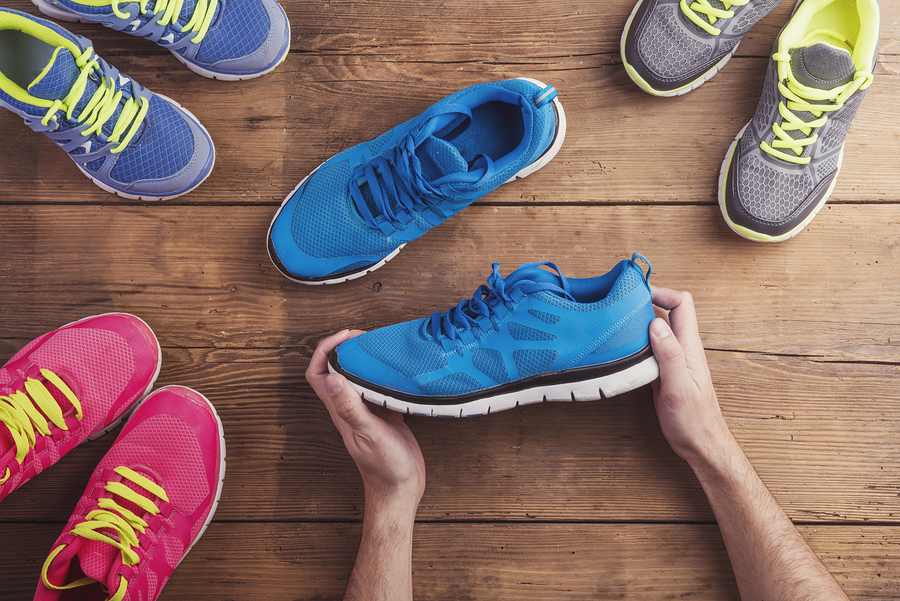It doesn’t matter if you like to run, hike, play basketball, do aerobics or play racquetball you’re most likely overlooking the most valuable piece of equipment for almost any exercise routine you can come up with. Do you know what it is? Exercise shoes!
Whether your fitness program is a 30-minute workout in your living room or an hour at the gym, it’s essential that you pick the right pair of workout sneakers. It’s simple to select the wrong pair and this blog will explore five mistakes that many make when choosing fitness shoes.
Using Your Exercise Sneakers for Everything
Never use your fitness sneakers for everyday activities! You’ll just end up wearing them out quicker. Purchase two pairs of sneakers: one for running errands or casual wear and the other pair purely for your workouts. Right after a workout, run or game, always store your fitness shoes in the closet.
Attempting to Purchase Athletic Sneakers Yourself
If you’ve discovered precisely which athletic sneaker is perfect for you and have been exercising or playing a sport for a lengthy amount of time, then it might be okay for you to select your own shoe. However, most of the time it’s a horrible idea to go to a sporting goods store, try on several pairs of sneakers and buy a pair that you believe is the right one. What you really need to do is go into an athletic specialty shoe store and speak with a professional. They can help you obtain the proper fitting shoe as well as the shoe that’s right for you.
These professionals will gather more detailed foot measurements than a regular shoe store. Taking your arch length, foot length and foot width will ensure that you get the actual shoe size you should wear. For example, if your measurements show you need to wear an 8½, that’s where the staff will begin. Every 8½-sized pair of sneakers aren’t generic and all are cut a bit differently.
In addition to performing a true fitting, the expert will want to know what sneaker has been beneficial to you in the past, they’ll evaluate your feet and your exercise activity history.
Remember to inquire about the athletic store’s return policy. Some of these specialty stores may only let you return the sneakers if they haven’t been worn outside.
Opting for Whatever Happens to be Available
When people begin to jog, walk or do another type of fitness program, often they just go into the closet and grab their old pair of sneakers. That’s an awful idea! Why? Those comfy but worn-out sneakers could be the wrong pair of shoes for your type of exercise; what’s even worse is your old sneakers won’t provide you with the needed support anymore.
Keeping Workout Shoes Longer Than You Should
This is yet another error that many people make. Exercise shoes begin to wear out while they look good and need to be replaced prior to the pair appearing worn. Why? It’s simple: you purchase these sneakers for the support and that’s the thing that breaks down. Eventually, you’ll experience aches or pains in your back, hips and/or knees.
If you’re just an occasional exerciser, you might be able to go without acquiring new athletic shoes for one year. However, if you’re the type that works out four or more times a week, then you’ll be making a trip to the athletic shoe store every six months, at best.
If you’re an avid runner, the experts say you’ll need to obtain new running shoes every 300-500 miles. Yet, if you aren’t that into running to have a mile count or if you prefer another sport, then buying a new pair of sneakers once per year will be fine.
Here’s an interesting fact: As we get older, our feet are apt to grow larger. This is a good reason you should have your shoe size examined each year.
Picking Out the Correct Shoe—but for the Wrong Exercise Routine
It’s vital that you’re selecting the right sneakers for exercising. For instance, to go for a jog, you shouldn’t wear a shoe made for racquetball or basketball. What’s the big deal, you ask? The shoes are made differently.
A shoe created for basketball or racquetball has built-in lateral stabilization because when you play those sports you continually move your feet from side-to-side. A runner’s shoe doesn’t need that lateral stabilization because you’re only moving your feet forward; thus, the sneaker provides you with stable support while your feet move in the running gait cycle.
You probably wouldn’t think there’s a difference between walking and running shoes—but there is. When you walk, you land more on your heel; when you run or jog, you land more on the front part of your foot. So to obtain a good shoe for walking you’ll want something that has more heel support with firm rubber. For running, you’ll require a sneaker that provides more of a cushion on the forefoot.
If you partake in one specific activity or sport twice a week or more, the American Podiatric Medical Association (APMA) suggests purchasing a sneaker made for a particular sport or activity.
But why can’t you buy a good pair of cross-trainer sneakers and use them for all activities? Well, that may work for you—and, then again, it may not. You see, most cross-trainer shoes can’t be used for just one thing. Sure, you can run a mile but they don’t have the support needed to run more than that. You can shoot some hoops with your children once in a while but the shoes only have a little lateral stabilization. On the other hand, you may be the type of person that isn’t an avid hiker, jogger or play one particular sport—you just like to dabble in each activity once or twice a week. If that’s the case, then a cross-trainer shoe would be okay for you.
A good cross-trainer sneaker isn’t hard to select, just look for:
- Good support that won’t allow you to bend the sneaker easily.
- A stiff heel.
- Light-weight.
People who perform varieties of casual fitness will find this type of shoe useful. With a good cross-trainer sneaker, you’ll be able to go for small walks on a track or paved roads, use the treadmill or go for a short run.
If you can avoid these simple mistakes, you’re sure to be successful in acquiring the right athletic shoes for your workout program. Not only will your feet thank you, but your body will too!
Teri
Latest posts by Teri (see all)
- Sleep Is a Necessary Part of Wellness - February 1, 2018
- Nutrition on the go - January 25, 2018
- Home Workouts: Lower Body - January 18, 2018


